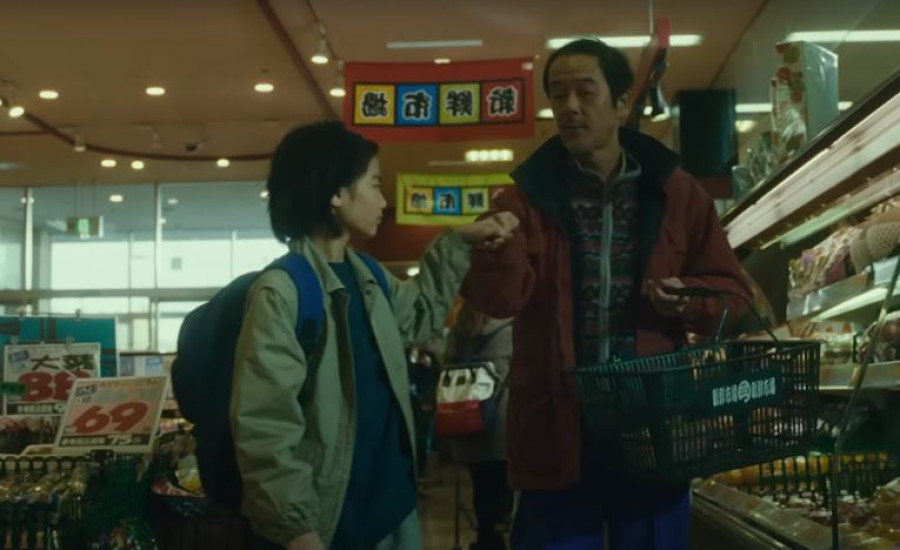Movies
Ties beyond blood
‘Shoplifters’ follows a family surviving on shoplifting and menial jobs, bound not by blood but by shared survival.
Timila Maharjan
‘Shoplifters’ is a Japanese movie written and directed by Hirokazu Koreeda that delves into the lives of a makeshift family surviving on the fringes of society.
Shota (Kaira Jo) and a father figure named Osamu (Lily Franky) are in the store, communicating non-verbally, passing from one aisle to another. The boy picks up things and stacks them discreetly in the bag, and the man helps him hide from others. They follow a well-established process, suggesting they have experience in doing it multiple times. Despite the criminal nature of their actions, these are portrayed with an empathetic perspective, highlighting their fight for survival rather than selfish motives. They shoplift everyday items like food, snacks, and toiletries to meet their basic needs.
On their way home, they discover a young girl near their house on a cold night. Despite their limited means, the man offers her a croquette, and she eventually accompanies them back to their home. The household she enters is anything but conventional. It consists of multiple generations crammed into a small space: a grandmother, a maternal figure named Nobuyo, and another woman named Aki. This tight living arrangement reflects the growing class divide in Japan. With the arrival of the girl, Juri, the family gains a new member. That night, when Osamu and Nobuyo attempt to return Juri, they overhear a violent argument between her parents, who don’t even seem to notice her absence. When they first find Juri, she is covered in bruises and cuts, revealing the abuse she has suffered. Moved by her condition, Nobuyo decides to bring Juri home, where they begin to live together as a family.
Nobuyo and Osamu defend their actions by arguing that it’s not kidnapping since they aren’t demanding a ransom. This reasoning mirrors Osamu’s justification for shoplifting, where he tells Shota that items in a store don’t belong to anyone until purchased, making it acceptable as long as the store doesn’t face ruin. This persistent moral ambiguity permeates the film, compelling viewers to grapple with complex questions about justice, survival, and love.
After taking Juri in, the family cuts her hair and changes her name to avoid attracting attention. Initially, they mishear her name as Yuri, but upon seeing a news report about her disappearance, they discover her real name is Juri. It was too late to return her by then, so they disguised her and renamed her Lin. For the first time, Juri experiences love and a genuine sense of belonging.
A deeply moving moment unfolds when Nobuyo gives Juri a dress. Initially reluctant, Juri hesitates, associating such gestures with her abusive mother’s manipulative cycle of harm and hollow recompense. Nobuyo’s gentle reassurance, “This is what people who love you should do,” is both tender and telling, subtly hinting at her painful past. This scene captures the heart of the film: imperfect individuals forging meaningful, healing connections. Each family member bears their own emotional wounds, but it is these very flaws that enrich their love and fortify their bond.
As the story unfolds, we learn more about the family’s circumstances. Osamu works as a construction worker until an accident leaves him unable to continue, Nobuyo is employed at a laundry, and Aki earns a living at an adult club. However, as their lives are revealed, questions arise about their true connections. Despite living as a family, it becomes clear they are not blood-related. Osamu wishes for Shota to call him “dad,” but Shota hesitates, saying he’s not ready. Similarly, Nobuyo hopes Juri will call her “mother,” and Osamu encourages Shota to refer to Juri as his sister. While they may not share biological ties, their desire to become a family is unmistakable.
They live as a family, but as the movie progresses, the true nature of their relationships gradually comes to light. The film challenges the conventional notion of family, exploring what it truly means to belong. Despite Juri not being their biological daughter, the family cares for her as if she were. In one poignant scene, Nobuyo reflects on their bond, suggesting that perhaps Juri chose them as her family. She remarks, “It’s good to choose your own parents,” highlighting the film’s core message: family is not determined by blood but by love, care, and the connections we choose to nurture.
As the movie approaches its conclusion, the intricate backstories of each character are gradually revealed, and the seemingly ordinary family is shown to have a deeply complex past. Their bonds are put to the ultimate test, leading to the heartbreaking separation of all family members.
What begins as a simple narrative evolves into a layered exploration of human connections and societal constraints. While the family shoplifts to survive and takes in Juri to protect her, their defiance of societal norms comes at a steep cost. The film carries a tragic undertone, exposing the vulnerability, innocence, and raw emotions of the children. Its ending is intentionally ambiguous, leaving viewers to wonder about the fate of each family member, particularly Juri, who is sent back to her abusive biological parents, highlighting the stark realities of their world.
Koreeda skillfully weaves moral ambiguity with profound emotional depth, prompting viewers to reflect on the essence of family, survival, and the meaning of belonging. ‘Shoplifters’ is a cinematic masterpiece—both heart-wrenching and tender—that leaves an enduring impact, resonating in the hearts and minds of its audience long after the credits fade. So, a rating of 4/5.
______
Shoplifters
Director: Hirokazu Koreeda
Starring: Lily Franky, Sakura Andô, Kirin Kiki, Kaira Jo
Duration: 121 minutes
Language: Japanese
Available: Amazon Video, Sky Store, Apple TV
Year: 2018




 20.12°C Kathmandu
20.12°C Kathmandu










